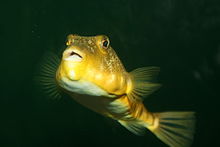- Northern puffer
-
Northern puffer 
Scientific classification Kingdom: Animalia Phylum: Chordata Class: Actinopterygii Order: Tetraodontiformes Family: Tetraodontidae Genus: Sphoeroides Species: S. maculatus Binomial name Sphoeroides maculatus
(Bloch & Schneider, 1801)Northern puffer, Sphoeroides maculatus, is a species in the family Tetraodontidae, or pufferfishes.[1]. They are commonly called sugar toads in the Chesapeake Bay region, where they are eaten as a delicacy.
Contents
Description
The northern puffer is a club-shaped fish with a gray, brown or olive back and a yellow or white belly [2].
Adults have small spines covering the entire body with a tiny beak-like mouth. Its color is poorly defined black/dark green spots and saddles and a yellow to white belly. It has Tiny jet-black pepper spots (about 1 mm in diameter) scattered over most of pigmented surface, particularly evident on cheeks. Lower sides of the body have a row of black, elongate, bar-like markings. A small dorsal fin is set far back near the tail. Sphoeroides maculatus, like others in the puffer family, "puffs up" into a ball in self-defense by inhaling air or water into a special chamber near its stomach. The northern puffer usually grows to about 8 to 10 inches.
Habitat
The northern puffer inhabits bays, estuaries and protected coastal waters.[3] It lives in temperate climates from Florida and the Gulf of Mexico to Newfoundland in Canada.
Diet
The northern puffer feeds primarily on shellfish, and occasionally on finfish. Using its beak-like mouth it can extract shellfish from their shells and sometimes break the shells to obtain a meal.
Life cycle
Little is known about the life cycle of the northern puffer. They spawn from May through August in shallow, nearshore waters. The female lays adhesive eggs that attach to the sandy or muddy bottom, and the male guards the eggs until they hatch.[4]
References
- ^ Froese, Rainer, and Daniel Pauly, eds. (2008). Species of Sphoeroides in FishBase. June 2008 version.
- ^ Chesapeake Bay Program
- ^ Fish Base Northern Puffer
- ^ Chesapeake Bay Program
Categories:
Wikimedia Foundation. 2010.
